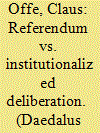|
|
|
Sort Order |
|
|
|
Items / Page
|
|
|
|
|
|
|
| Srl | Item |
| 1 |
ID:
153768


|
|
|
|
|
| Summary/Abstract |
The much-discussed crisis of political parties poses a challenge to democratic theorists as institutional designers: how can the capacity of parties to mediate between society and state be resuscitated? In this article, we suggest that parties need to become more internally deliberative, allowing partisans to debate policy and more general visions for the polity. We outline a prescriptive model of deliberative intraparty democracy, drawing on the empirical literature on the changing structure of civic and political engagement. We argue that deliberative reforms are the most appropriate response to the demands of an increasingly more cognitively mobilized citizenry which seeks self-expression and nonhierarchical forms of political engagement. We highlight the model's distinctive strengths and defend it against several objections.
|
|
|
|
|
|
|
|
|
|
|
|
|
|
|
|
| 2 |
ID:
171332


|
|
|
|
|
| Summary/Abstract |
Inspired by impossibility theorems of social choice theory, many democratic theorists have argued that aggregative forms of democracy cannot lend full democratic justification for the collective decisions reached. Hence, democratic theorists have turned their attention to deliberative democracy, according to which “outcomes are democratically legitimate if and only if they could be the object of a free and reasoned agreement among equals” (Cohen 1997a, 73). However, relatively little work has been done to offer a formal theory of democratic deliberation. This article helps fill that gap by offering a formal theory of three different modes of democratic deliberation: myopic discussion, constructive discussion, and debate. We show that myopic discussion suffers from indeterminacy of long run outcomes, while constructive discussion and debate are conclusive. Finally, unlike the other two modes of deliberation, debate is path independent and converges to a unique compromise position, irrespective of the initial status quo.
|
|
|
|
|
|
|
|
|
|
|
|
|
|
|
|
| 3 |
ID:
193651


|
|
|
|
|
| Summary/Abstract |
Democratic theorists have long argued that states can create more resilient democracies through education. Educational investments are thought to produce more economic equality and instill in citizens greater capacity and responsibility to participate in politics. Using a geographic regression discontinuity design and township-level data from Antebellum New York State, we examine whether state funding for common schools led to higher voter turnout as well as higher earnings and lower inequality. Our estimates support the view that a participatory democratic culture emerged not only because of initial favorable endowments but also because of subsequent government decisions to fund education. New York townships that received more school funding later had higher median earnings, lower earnings inequality, and higher levels of voter turnout. Our findings support the view that maintaining democracy requires active investments by the state, something that has important implications for other places and other times—including today.
|
|
|
|
|
|
|
|
|
|
|
|
|
|
|
|
| 4 |
ID:
154139


|
|
|
|
|
| Summary/Abstract |
This essay proceeds in three steps. First, it will briefly outline the often invoked “crisis” of representative democracy and its major symptoms. Second, it will discuss a popular yet, as I shall argue, worryingly misguided response to that crisis: namely, the switch to plebiscitarian methods of “direct” democracy, as advocated, for example, by rightist populist forces in many European Union member states. The United Kingdom's Brexit referendum of June 2016 illuminates the weaknesses of this approach. Third, it will suggest a rough design for enriching representative electoral democracy with nonelectoral (but “aleatory,” or randomized) and nonmajoritarian (but deliberative and consultative) bodies and their peculiar methods of political will formation (as opposed to the expression of a popular will already formed).
|
|
|
|
|
|
|
|
|
|
|
|
|
|
|
|
|
|
|
|
|